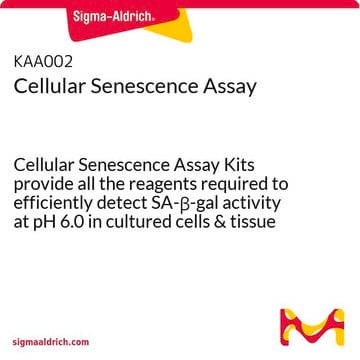AB3598
Anti-Mitochondria Antibody
serum, Chemicon®
Synonyme(s) :
Anti-ACNINV3, Anti-FAD, Anti-PS-1, Anti-S182
About This Item
Produits recommandés
Source biologique
rabbit
Niveau de qualité
Forme d'anticorps
serum
Type de produit anticorps
primary antibodies
Clone
polyclonal
Espèces réactives
monkey, human
Fabricant/nom de marque
Chemicon®
Technique(s)
immunocytochemistry: suitable
western blot: suitable
Entrée
sample type neural stem cell(s)
Numéro d'accès NCBI
Numéro d'accès UniProt
Conditions d'expédition
wet ice
Modification post-traductionnelle de la cible
unmodified
Informations sur le gène
human ... TOMM20L(387990)
Description générale
Spécificité
The antibody shows a moderate titer by ELISA to the immunogen peptide but does not immunoblot any expected presenilin 1 bands. Immunocytochemistry with the serum revealed a mitochondria-like staining that was still present after exhaustive preabsorption with the peptide. The staining co-localizes with CHEMICON′s anti-mitochondria antibody MAB1273.
Immunogène
Application
Immunocytochemistry: 1:100-1:300 on COS7, HeLa, 293 and SK-N-MC cell lines.
Optimal working dilutions must be determined by the end user.
Stem Cell Research
Neural Stem Cells
Description de la cible
Forme physique
Stockage et stabilité
Remarque sur l'analyse
HeLa whole cell extract, human neuroblastoma SH-SY5Y cells
Informations légales
Clause de non-responsabilité
Vous ne trouvez pas le bon produit ?
Essayez notre Outil de sélection de produits.
En option
Code de la classe de stockage
10 - Combustible liquids
Classe de danger pour l'eau (WGK)
WGK 1
Certificats d'analyse (COA)
Recherchez un Certificats d'analyse (COA) en saisissant le numéro de lot du produit. Les numéros de lot figurent sur l'étiquette du produit après les mots "Lot" ou "Batch".
Déjà en possession de ce produit ?
Retrouvez la documentation relative aux produits que vous avez récemment achetés dans la Bibliothèque de documents.
Notre équipe de scientifiques dispose d'une expérience dans tous les secteurs de la recherche, notamment en sciences de la vie, science des matériaux, synthèse chimique, chromatographie, analyse et dans de nombreux autres domaines..
Contacter notre Service technique








